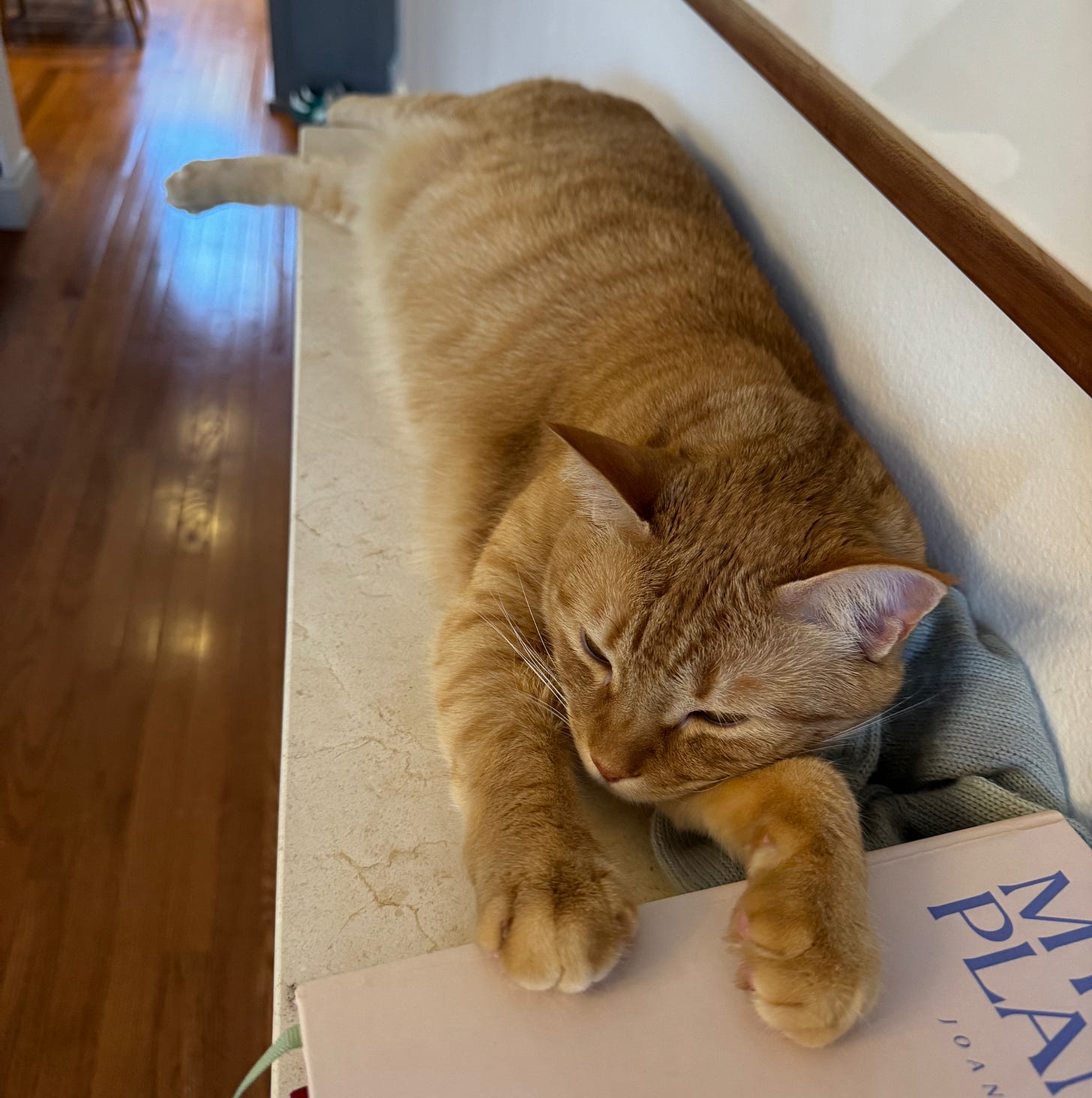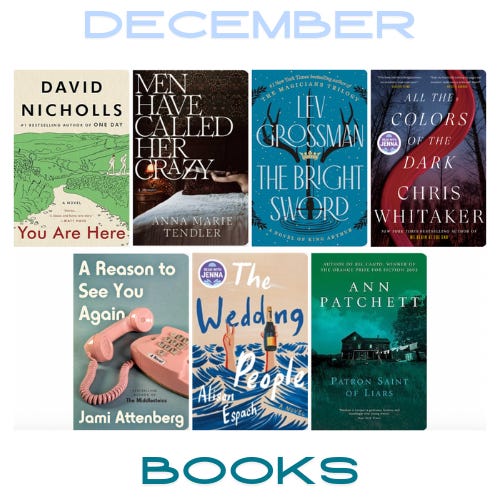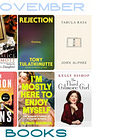everything I read in December
Ann Patchett's debut novel was the highlight. Also, I figured I'd share the 10 best books I read in 2024.
Lately: I cannot say enough good things about this granola from . In fact, it may be the best granola I’ve ever tasted. Make it, devour it, check out the newsletter. … Most years, I make a few reasonable New Year’s resolutions. This year, I made one, which sounds simple but feels insurmountable: Cook more lunch food, and consistently have protein and vegetables around to eat at lunchtime. You see, I’m a terrible lunch eater. I’m prone to snacking throughout the midday hours, usually on food that’s not terrible for me but also not great. This year, I’d like to actually ingest some nutrients at lunchtime. So far, I’ve made chicken salad (for sandwiches on homemade brioche), along with a beef and tortellini soup cobbled together from leftover pot roast. I have my eyes on a green soup for next week. But if you have any lunchtime recommendations or recipes, drop them in the comments, please!
everything I read in December (and the best of 2024)
Are you tired of year-end lists yet? Or did two weeks off1 give you a renewed need to see and judge what others have consumed? I sure hope so, because I can’t resist dedicating a quick section of this newsletter to the books I liked best in 2024. Somehow2, I finished 76 books over the course of the year, with a heavy focus on fiction3. It’s hard to pick an unequivocal favorite, but if I had to, I’d lean toward Piglet, the borderline psychedelic tale of a woman’s descent into gluttony in the days leading up to her ill-fated wedding. Speaking of psychedelics: You Dreamed of Empires was mind-blowing. And speaking of wacky, sideways, not-quite-historical fiction, you should all go read Cahokia Jazz immediately.
I read two debut novels that knocked the wind out of me in the best possible way: Goodbye, Vitamin and The Patron Saint of Liars. And three of the quietest books I read this year — quiet in tone, in the simplicity of their prose — keep echoing in my brain. One, The Anthropologists, tells the story of a immigrant couple in an unnamed city as they try to buy a home and build a life. The other, The Book of Goose, is set in post-World War II France, where two young girls build a stunning work of fiction. And the third, Mina’s Matchbox, is a recent translation from Japanese and is also set in a country still reeling from the aftermath of the war.
The final two books I’ll mention are family dramas about people who could not be more different — but they stood out in part due to one commonality: their vivid characters. These were all memorable people, be it the Ames family in Same As It Ever Was or the Fletchers in Long Island Compromise. And now that I’ve made it here, I’m beginning to wonder if Taffy Brodesser-Akner’s second novel, about a Jewish family in the aftermath of a kidnapping, might actually edge Piglet as my favorite thing I read last year. It certainly made me laugh the hardest.
And now, here’s everything4 I read in the final month of 2024:
I didn’t want it to end
The Patron Saint of Liars by Ann Patchett: I’m planning to finish the entire Patchett canon in 2025, and last month, I dug into her debut novel about a (married) woman who, upon finding out she’s pregnant, disappears from her own life and moves into a home for unwed mothers in Kentucky.
If you’ve been following closely here, you might recall I read Alice McDermott’s debut in November (I’m on a mission to study the first novels of the authors I most admire) and didn’t love it. It was comforting to see how McDermott has grown and evolved into the writer she is today. Well, that wasn’t the case with Patchett. My God. “The Patron Saint of Liars” is a masterpiece. I couldn’t get enough of the characters, the plot, the sentences, all of it. I felt like I was living in Habit, Kentucky the entire time I was reading this book — which wasn’t long, since I couldn’t put it down.
The Wedding People by Alison Espach: This is not my typical genre, but everyone, it seemed, was swearing by this book. It helped that I went in with low-ish expectations: I was expecting Emily Henry, and I got something more nuanced — plus a whole lot of St. Louis references, which were a pleasant surprise. Is this a great work of literary art? Absolutely not. But it was a great way to turn my brain off for a few days during the busy holiday season, and it made me laugh hard and often.
I only wanted it to end because the resolution was so perfect
All the Colors of the Dark by Chris Whitaker: Another book everyone’s talking about, another genre I don’t usually delve into. And again, I loved it. Again, I loved all the unexpected Missouri details — even if the author has some serious issues with Midwestern geography. (Someone living in the Ozarks would not mention Cedar Rapids, Iowa, so much!)
The best thing I can say about this book was that I found it grossly overwritten and still didn’t mind. I was too glued to the characters and their universe and the persistent question of what the hell was about to happen. This is one of those books in which the thing you expect to be the major plot point happens within the first 50 pages, leaving you wondering how the next 500 will unfold. And the way the author ties up the various threads in the end will blow your mind.
A doozy of a memoir
Men Have Called Her Crazy by Anna Marie Tendler: Before his divorce and his new face, I was a huge John Mulaney fan. I still think he’s very funny, for better or for worse. And at some point, years ago, I decided to Google my way into his personal life after hearing a few references to his wife and dog in his sketches.
I was immediately fascinated. His wife, it turned out, made wonky, elaborate lampshades for a living and wore stunning gowns anytime she showed up on a red carpet. And then, after they got divorced and she suffered a significant mental health crisis, she wrote this memoir — which is more about the crisis than the breakdown of her relationship with the famous comedian. (In fact, she must have signed a pretty significant NDA; Mulaney is never mentioned by name, and the divorce is only alluded to, though its fingerprints are all over Tendler’s story.)
Hey, these were very good, too
You Are Here by David Nicholls: I’ve only read one of Nicholls’s other books: “One Day” — which made me cry when I read it in 2009 and uncontrollably sob even worse when I watched the show (twice, in rapid succession) earlier this year. “You Are Here” isn’t quite “One Day,” but I didn’t expect it to be. The characters were more frustrating, and more like caricatures, but their emergence from late-30s romantic desperation was heartwarming, and I thought the plot also did a nice job examining some of the mental health consequences of the pandemic without being too on the nose.
The Bright Sword by Lev Grossman: If I’d known the heft of this book before picking it up at the library, I might have avoided it. But instead I requested it without realizing it was 600-odd pages and weighed about as much as a large toddler, and then it was in my house, and then I opened it, and by the final page I was glad I’d committed to the saga.
I like King Arthur stuff. I’m not obsessed, and I’ve never totally immersed myself in the fantasy, but since I first watched “The Sword in the Stone” 35-ish years ago, I’ve been at least tepidly intrigued by all things Merlin and the round table. That alone might not have been enough to keep me hooked on this comical riff on the post-Arthur world — but I also happen to love “Monty Python and the Holy Grail.” It’s one of the dweebiest things about me. I can quote entire scenes. And this book is very Monty Python-esque. Very “your mother was a hamster and your father smelt of elderberries” — somehow without being totally absurd. Do I recommend it? Only to a very specific demographic.
A Reason to See You Again by Jami Attenberg: Here, now, is a book I’d recommend far and wide, to anyone who will listen. Love a smart, sometimes cynical, occasionally humorous family drama? Identify with difficult characters? This one’s for you. It tells the story of three generations of Jewish women as they negotiate their place in the world and their complicated, often alienated family. I tore through it. (Also, the author writes one of my favorite Substack newsletters about writing and life,
.)I was supposed to send this out last week, when it still felt more like the new year was fresh, but then I wrote about Jimmy Carter instead, and now the new year feels exceptionally stale and awful, but here we are.
Oh, actually, I know how: I quit my job in April.
I decided to make this list entirely fiction, for that reason. My nonfiction favorites were The Upstairs Delicatessen, Look Alive Out There and This Is the Story of a Happy Marriage.
Everything, with the exception of Expecting Better by Emily Oster, which I don’t think is worth reviewing for these purposes. But if you’re thinking of having a baby, I thought it was an interesting resource, though certainly not something I’ll obey every word of.











When can I send you an e-mail message about us placing orders with you as a writer?
Hi Joan. Sorry to barge in like this. I'm writing A.J. Foyt's biography, Volume One of which is already out: "A.J. Foyt: Survivor, Champion, Legend." I've been trying to reach Ed Hinton without success. He did a number of great stories on A.J., one of which you shared in Grantland, “Director’s Cut: ‘The Last Ride of A.J. Foyt.” Was hoping you might know of way to contact Ed.